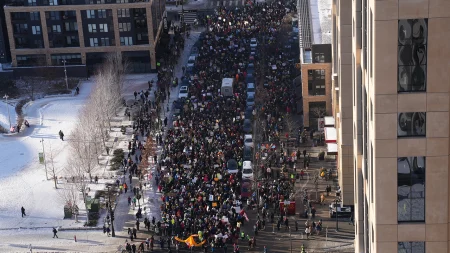Dallas Immigration Facility Shooting: Targeted Violence with Anti-ICE Messages
In a disturbing development that has shaken the Dallas community, the FBI has revealed that ammunition used in a recent shooting at an immigration facility contained anti-Immigration and Customs Enforcement (ICE) messages. The incident, which occurred at a Dallas ICE facility, resulted in at least one fatality and two injured individuals. During a Wednesday morning press conference, Joe Rothrock, Special Agent in Charge of the FBI’s Dallas Field Office, confirmed that investigators are treating this tragedy as “an act of targeted violence,” suggesting the perpetrator deliberately chose the location and victims based on their connection to immigration enforcement.
The discovery of anti-ICE messages written on the ammunition provides troubling insight into the shooter’s potential motivations, highlighting how increasingly polarized political rhetoric surrounding immigration issues may contribute to real-world violence. This case appears to represent an extreme manifestation of tensions that have been building around immigration policies and enforcement in recent years. The targeting of a federal immigration facility raises serious concerns about security at government installations and the safety of personnel working in politically contentious fields. While details remain limited at this early stage of the investigation, the FBI’s characterization of the attack as targeted violence suggests a premeditated act driven by specific grievances rather than random violence.
Authorities have not yet released the identity of the shooter, who was found deceased on a nearby rooftop following what investigators determined was a self-inflicted gunshot wound. This detail indicates the shooter may have planned an attack position with an escape route or vantage point, further supporting the FBI’s assessment of premeditation. The investigation will likely focus on uncovering the shooter’s background, possible affiliations with extremist groups, online activities, and any warning signs that might have preceded this violent act. Understanding the path to radicalization that led to this tragedy could provide valuable insights for preventing similar incidents in the future.
The human toll of this attack extends beyond the immediate casualties to affect families, colleagues, and the broader community of those who work in immigration services. Federal employees serving in immigration enforcement already face significant challenges and stresses in their daily work; an attack specifically targeting them for their professional role adds another layer of trauma and concern. For surviving victims and witnesses, the psychological impact of such violence can be profound and long-lasting. Community support services and counseling will be essential as those affected begin to process and recover from this traumatic event. Additionally, other immigration facilities across the country may now face heightened security concerns and anxiety among staff.
This incident occurs against a backdrop of intense national debate around immigration policies, enforcement priorities, and treatment of migrants. Immigration has remained one of the most divisive political issues in America, with passionate advocates on all sides. While policy disagreements and peaceful protest are fundamental to democratic discourse, this violent attack represents a dangerous crossing of lines that threatens the very foundation of civil society. Law enforcement officials and community leaders will need to balance thorough investigation and security responses with careful messaging that condemns violence without further inflaming tensions around the underlying policy issues.
As this remains a developing situation, more details will likely emerge in the coming days about the shooter’s background, possible warning signs, and the full circumstances of the attack. The FBI and local authorities will continue their investigation, gathering evidence from the scene, analyzing the messages written on the ammunition, interviewing witnesses, and exploring the shooter’s personal history and connections. The findings may ultimately inform not only the specific case but also broader strategies for preventing targeted violence against government facilities and personnel. Meanwhile, the Dallas community and the nation as a whole must grapple with this troubling reminder of how political animosity can evolve into deadly violence, challenging us all to find better ways to address our differences while rejecting extremism in all its forms.











